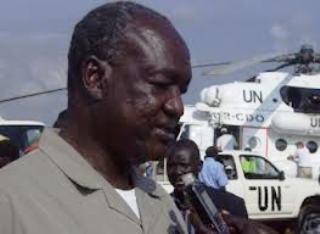Jonglei: Hundreds feared dead or missing in Akobo county attack
February 9, 2013 (BOR) – At least 103 civilians and 14 South Sudan army (SPLA) soldiers are missing, feared dead, after an unknown group attacked a village on Friday in South Sudan’s Jonglei state county of Akobo, the state governor told Sudan Tribune.

State governor Kuol Manyang confirmed the figures, adding that 14 people, including eight SPLA soldiers were wounded in the attack, while the whereabouts of hundreds of women and children remain unknown.
The attack took place at Mantor between Thakuach and Jier localities, more than 100km north-west of Akobo town and about 40km north-east of Walgak payam (district) during the community’s yearly migration to cattle camps at Sobat river.
In a statement released by Akobo county commissioner Goi Jooyul, he said “unarmed Akobo civilians escorting their cattle were murdered in cold blood” after being violently attacked by a heavily-armed group believed to be criminals from the Murle tribe or Yau Yau rebel group.
The commissioner confirmed an unspecified number of children had been abducted, while thousands of head of cattle were also seized in the attack.
Jooyul said in the statement that the ferocity of the attack had overwhelmed an SPLA force accompanying the people, while survivors had confirmed the use of heavy weaponry including RPGs by the assailants, as well as the use of spears and machetes by some.
Manyang described the incident as the worst-ever attack in the area since March last year, but said rescue efforts were underway to establish the actual numbers of casualties.
He urged the population to remain calm, saying the army is trying to follow the attackers and track them down. However, Manyang expressed fears that thick undergrowth in the area, coupled with the long distances, could hamper the army’s efforts to pursue the attackers.
“Walgak is very far, and [the] bush is very thick, the army might not get them”, he said, adding it was still unclear how many people were dead or missing following the incident in the remote corner of Jonglei.
A disarmament campaign initiated by the South Sudanese government in March last year has been marred by several cases of human rights violations, allegedly committed by the army on civilians.
Manyang, on the other hand, blames sections of the population for concealing guns, which they later use to cause instability in the state.
“These people hide their guns, and always keep telling others that we have given our guns [to authorities], but look at what happened,” he said.
Some of the attackers, he said, were dressed in military attire, raising fears that rebels operating in the state could have been part of the plot, largely blamed on the Murle tribe.
Jooyul said the Akobo community has suffered almost a dozen fatal attacks since May 2012, including one on Christmas Eve in Wanding in which three girls were abducted.
Jooyul called for immediate humanitarian intervention in Walgak following the latest outbreak of violence, saying Juba had continually ignored the plight of people in the region and more needs to be done in terms of recovering the missing people and cattle.
“There is no single road passable road through Lou land to aid the pursuit of criminals or even provide the needed food for the hungry populations. The costs for silence in Juba are enormous for inaction and consequences cannot be reemphasised,” he said.
SPLA spokesperson Phillip Aguer told Sudan Tribune he had no information on the attack in Akobo.
(ST)
